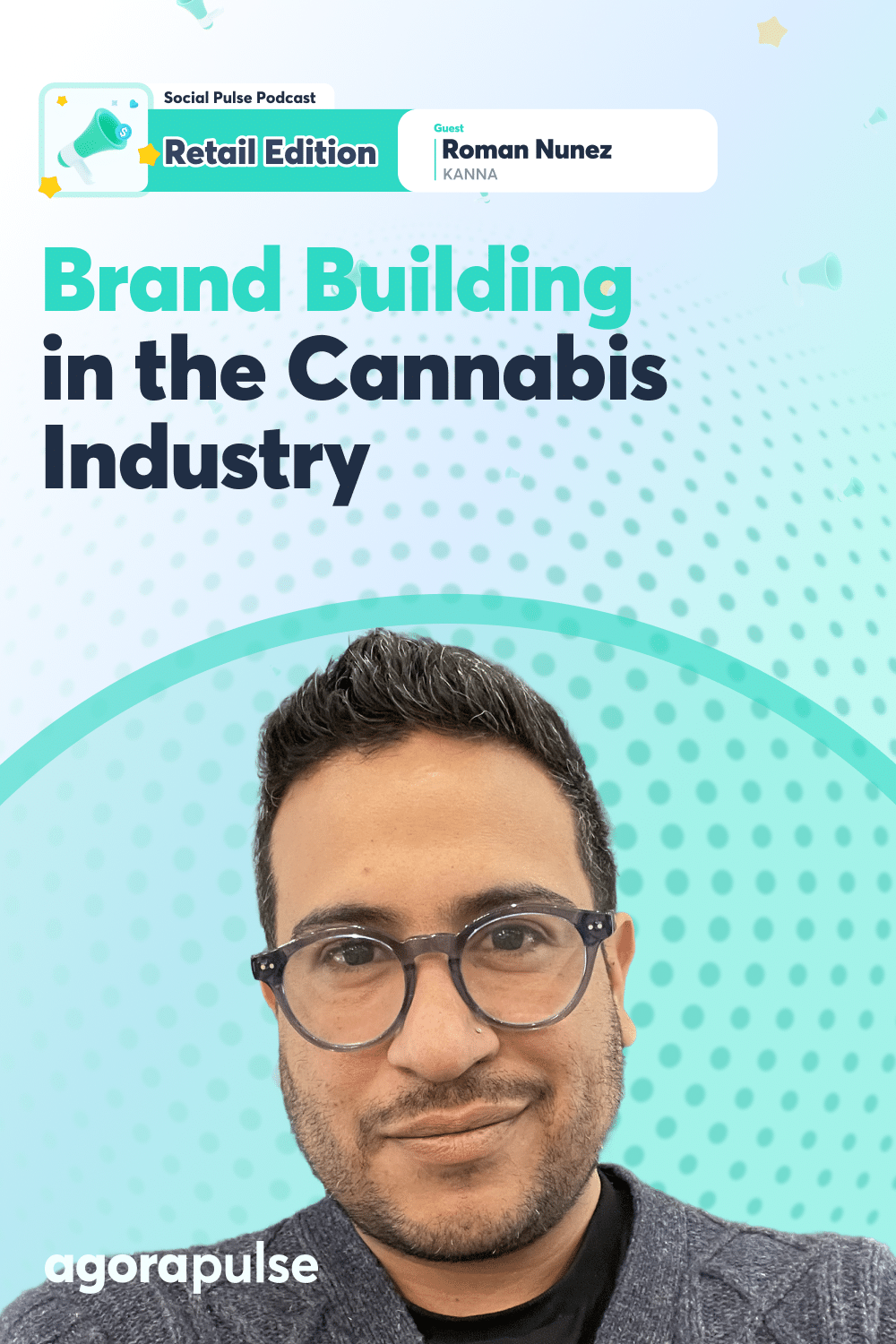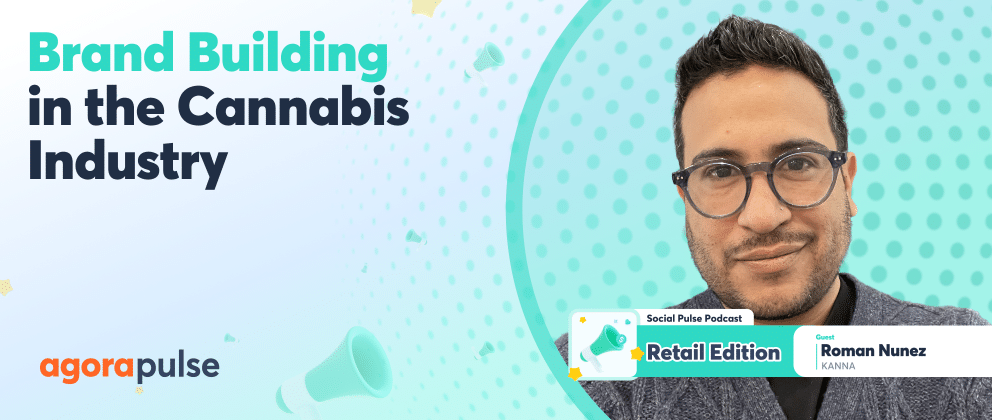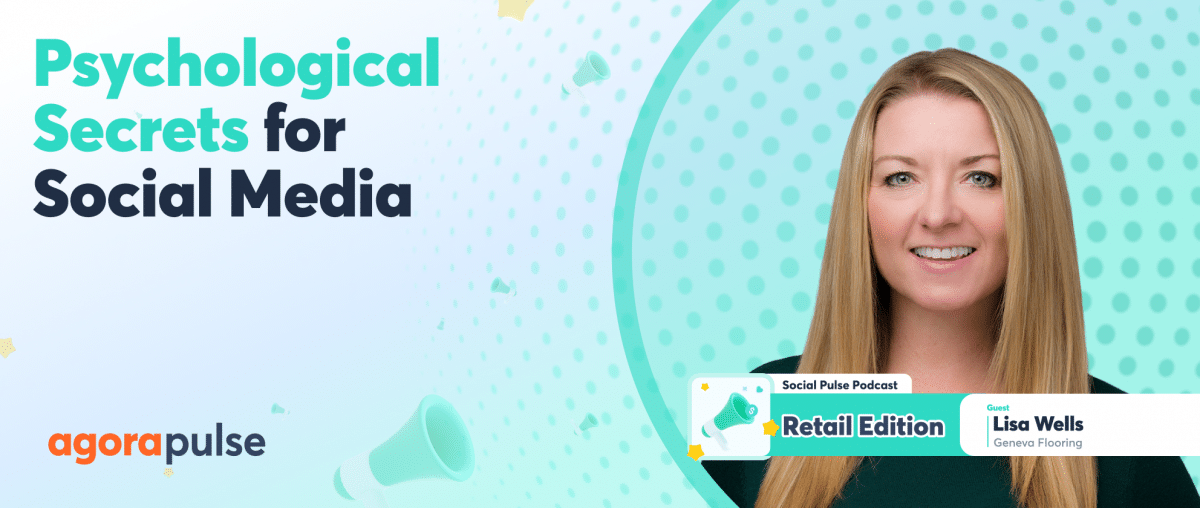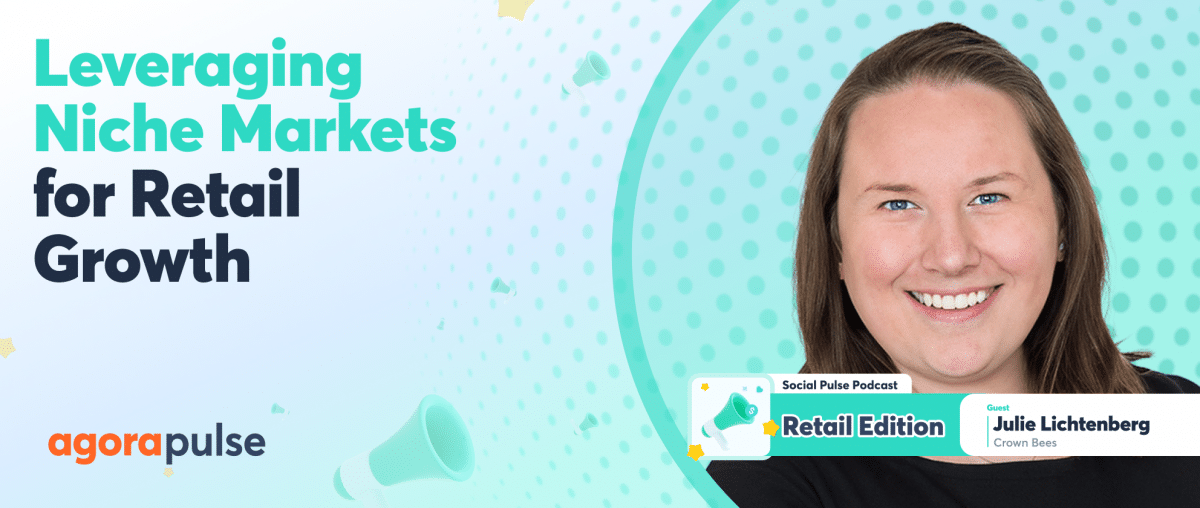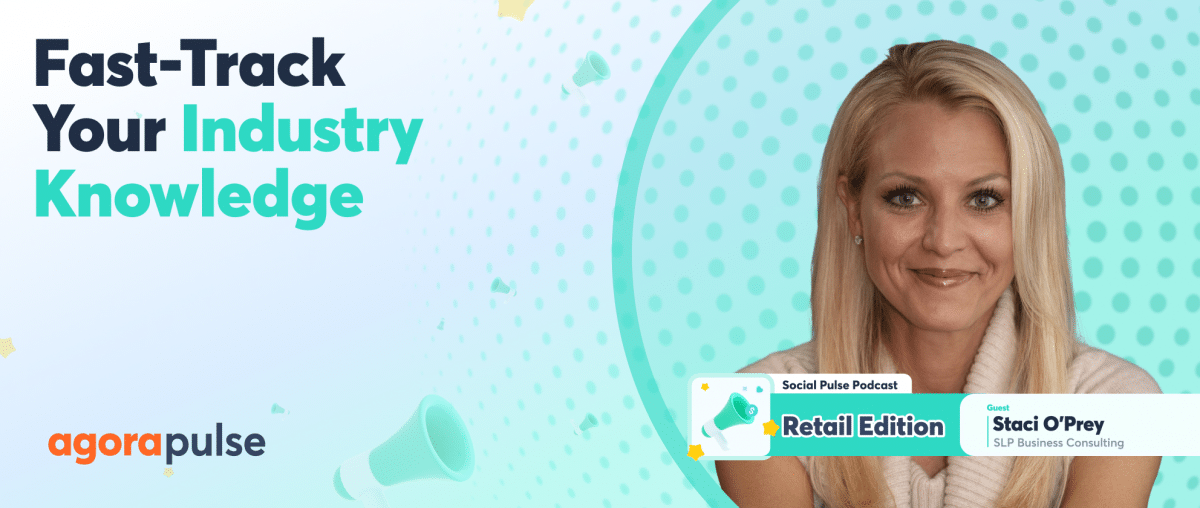Today’s Social Pulse: Retail Edition guest Roman Nunez, marketing director at Kana Dispensary, brings a fascinating blend of tech startup experience and creative artistry to the cannabis industry. His unique approach to authentic marketing in a heavily restricted industry offers valuable lessons for any retail marketer facing challenges with regulations, platform limitations, or audience targeting. Don’t miss this episode as he talks with host Agorapulse’s Chief Storyteller Mike Allton.
[Listen to the full episode below, or get the highlights of the Social Pulse: Retail Edition, powered by Agorapulse. Try it for free today.]
What are some of the most surprising limitations that you encountered when you first got into this cannabis space?
Roman Nunez: You’re essentially operating in an interesting space in cannabis. You’re doing something that’s federally illegal, and simultaneously, you’re seeing benefits in your community.
You’re helping people with pain, with stress, PTSD—you’re doing the right thing, but for some reason, you’re not allowed to tell the world about it. So it’s an interesting place to be in. Lots of challenges, like you mentioned earlier, that we can’t do anything about on social media.
So it’s been navigating that path with Meta to see what we can post. So we can do things like we can foster our community, could talk about our events, can do educational stuff.
There are ways around it without specifically advertising your product. A lot of it has to do with education and fostering that community.
How did you define your brand voice?
Roman Nunez: As a kid, growing up in the nineties, I’m still a Nike head. I’ve always enjoyed brands like Nike. I am attracted to brands that have simple, simple designs.
I think Chanel is one of the best-looking brands. Like, just everything they do is so simple. There’s not a lot of fluff or detail. Apple: It’s just like you have that symbol; it’s very clean. I’ve always been a minimalist in that way, and I’ve always been attracted to that. There’s something left to the imagination with that.
So, when we started the brand, for me, it was about being iconic and having an icon like those brands that I was attracted to. So I started with that and started trying to build our brand voice.
And so I came from Yelp, too. Yelp always has this fun brand voice, so I wanted us to be fun, but also because it’s a black-owned business, it’s in Oakland, I wanted to have a little bit of authenticity in where we come from. So, when we speak to our target audience, we’re a little more familiar, if I can say it like that.
We’re just going to be your mom-and-pop local store. So, we interact with our—we call ’em our can of fam. We call each other family. When people walk into the store, they feel like they’re at home. So, we just try to foster those tight relationships because we can’t advertise like you mentioned.
A lot of it is about making people feel like they’re part of a family.
Mike Allton: As a storyteller, I love how you’re weaving in all these critical elements: your voice, your style, your culture. That’s now all a part of not only who you are, but it’s a part of the messaging, and it’s reflected in everything that you’re doing online, which is terrific, and that’s why you guys are having so much success in building community. I know many of the retailers listening might face some sort of restriction, maybe not the same ones that you are, maybe not as severe as cannabis.
What are some universal principles that we could talk about from a restrictive marketing perspective?
Roman Nunez: Yeah, a big one is the universal principle of marketing in our space is listening.
I think that a big piece that sometimes other brands miss is listening to your constituents. I spent some time just bud-tending. I’ve had a little bit of experience, but not a lot, because I just wanted to listen and understand our client’s voice.
So just take that time to listen to your customers, get feedback, give them all the form, and surveys can reward them, get those reviews, do a great job, and listen to what they want and what they’re saying.
I think that a big part of marketing is understanding what your client base wants, what the other brands aren’t offering, and what the other stores that they could go to just aren’t doing for them.
I try to tap into that and see how we can be better and fill those gaps.
Could you give an example of a creative marketing solution you’ve implemented despite limitations?
Roman Nunez: Honestly, man, the best, biggest tool we do—and in every business, this is probably going to be true in this day and age—is collecting those emails, collecting those phone numbers, getting that gold from your customers because you use that to segment your SMS marketing, your email blasts. You could reach out to customers who, for example, we have customers who come in that like edibles.
So what I’ll do is I’ll segment that group and reach out to ’em with customized digital assets that are aimed at bringing those customers back through our door. We’ll tell ’em about fresh drops, things that are happening, educational stuff. So, I like the segmentation aspect of understanding what customers want and marketing to them directly rather than just using blanket solutions.
I would say our biggest success has come from email and SMS marketing and using those segments to surgically get in there and send the right message to the right people.
Now you also mentioned in-person events. Tell me what those look like.
Roman Nunez: You know what’s funny is the challenge is there too with these events. When we first opened, we had a huge backyard. It’s beautiful. There’s grass, there are picnic tables. So we were utilizing that and having a great time. But ultimately, we have some neighbors, and so we’ve had DJs back there. Some people in the neighborhood just don’t want us there because we’re a dispensary, so they have this idea of what we could be, and so I spent a lot of time going to the neighbors saying, “Hey, we want to invite you to our backyard. We’re having a barbecue, this and that.” But that ultimately turned out to not work because then eventually, we had permit issues back there. And so we said, “Okay, let’s reset. Since we can’t just do whatever we want in our backyard, let’s now strategize educational stuff.”
So we have in-store demos with some of our brands, and we’ll have them come in and they’ll set up their little table with informational stuff and just connect so the customers connect with the brands directly. We do in-store demos, and that does help. I mean it, if people aren’t expecting it and they come in, sometimes they get introduced to a new brand.
So, having some of those brands that we carry from a retail perspective come in and do an in-store demo? Say, maybe we’ll have a food vendor come and just make tacos for a few hours. It cost us 500 bucks or something. But some of those interactions can be lifelong customers that we’re taking care of, and communities are in our name, in our brand name. So we like to just do stuff to give back to the community instead of some of those restrictions.
But as far as events, yeah, it’s a lot of in-store demos. We do have Oktoberfest on our block that shuts down the street every year in October. And there are music and food vendors, and it’s a chance for the general public to get introduced to us. So we take advantage of the festival that happens on our street every year. It’s in Oakland, California. It’s called Oktoberfest, typically the last weekend of October. And just a ton of music, and it’s fun. So, I encourage anyone to swing by Kanna if you happen to be in Oakland during October.
How do you maintain brand authenticity when you’re constantly having to find these workarounds and alternative channels?
Roman Nunez: The brand itself, we have our ethos, which is the cannabis community and because those three pillars are what we stand on. As long as we are providing the best high-quality, safe, tested products, as long as we are giving back to our community and taking care of those who take care of us, and as long as we stay true to our cause, I feel like those things are going to stand out. Those things are going to get us across the finish line. They’re going to help us hit all our goals.
As long as we’re doing that, I feel like we’re headed in the right direction. All our marketing decisions are based on that. We have a lot of charity stuff on the books as far as just cleaning up our neighborhood, doing trash pickups, and getting people on board with that.
Staying true to who we are, I think, is going to be the best marketing tool we’ve got.
What about your tech startup experience?
Roman Nunez: The tech stuff, systems data, that taught me all that stuff. So I’m bringing that to Kanna. Truthfully, cannabis operators aren’t always from that background. So for me, coming in there, there was a lot of work to do. I’m like, “We need to organize our data.”
You know what I mean? The most valuable thing we got is data. So, taking all that understanding of our customers’ age, demographics, and all that good stuff, that is what we used to do at Yelp. You know that in my previous experience, I started a little company called Eat24. That was just a little startup, and it got big enough to where it was acquired by GrubHub and then eventually by Yelp. It changed hands. So, we built this business from the ground up. What I learned from that experience is just understand your data, get your data, put it in a nice format, like whatever tool you use, make sure that you have all your dashboards set up so you can read what’s happening, tell that story, and chart your path.
But that’s what I brought to this experience: understanding how valuable that data is and leveraging that to ultimately turn that into revenue.
Could you share how you’re building an online community?
Roman Nunez: It’s so online stuff, like I said when we advertise events, we’re always saying, “Tag your friends!” We’re doing stuff like starting to use this item called a cannabis bouquet, where instead of just getting some in a jar, it’s actually on a stick. It looks like a bouquet.
So what we do is we use that and say, and make a clever Instagram post about it. Not advertising it necessarily. But it generates likes and re-shares, and it gets those good metrics going in our social, so trying to be unique.
People know our budtenders now from social media. They’re like, “Oh, like I see you on there!”
It’s creating little superstars behind the counter, just having fun. You have to have fun. It has to be authentic. We’re not trying too hard.
I think that’s the key. Don’t make sure whatever your marketing messaging you’re doing, whether it’s on social media or in your email, newsletters, whatever, just be authentic, be fun, and be lighthearted about it, because I think sometimes if you can get too serious and get in the weeds there.
Mike Allton: Yeah, that sounds fantastic. And I love that you’re bringing your staff into your social presence.
It’s something we talked a lot about in a previous episode with Dierbergs Markets. They’re a supermarket chain here, local to me in St. Louis. And they’re putting their butcher on their TikTok account. They’re putting them, all the produce guy, whoever, so when folks come into their stores, they’re making those community connections.
How are you currently measuring the actual business impact of everything that you’re doing on social?
Roman Nunez: We made a conscious effort not to try to look at those KPIs as this; we’re using social media to push our business. I steered away from that in the beginning. I’m like, “We are limited. We technically can’t post.”
Social media, let’s not lean on that to get sales. Let’s lean on that just to build community. If it does get a sale and does generate business, that’s fantastic. I look at the data, of course, and it doesn’t tend to translate to revenue specifically.
It’s more like a new customer comes up, and we’ll start seeing new customers come in. So, those are the KPIs that I track: the key performance metric is bringing people through the door, and ultimately, that does lead to revenue. But I track a lot of stuff. But I try not to lean on that to build a business. I try to lean on that just to foster community. And we don’t do a lot of discounts. We find that we do a lot better with everyday low pricing and deals. So we’ll have bundles and deals, and we’ll run promos with some promotional items and buy two, get one.
We’ll do a lot of that instead of offering a lot of discounts. And then we’re treating people like family. So if we’re doing that, then we’re not resting so much on social media because we can’t, but also because it’s better, I think, to rest on your business practices and amazing customer service. As far as moving the needle on revenue, that’s what I’d say.
What resources or communities have you found to be just the most valuable?
Roman Nunez: Yeah, in our industry, we have different seminars and webinars that you can attend, that I’m always on. And it just talks about what’s going on in the industry, best practices, new stuff like that. I do a lot of that stuff.
Just to keep up with what trends and what’s happening in the industry. But as far as marketing via social media I depend a little bit on some of our, like I said, younger, more savvy because it’s almost silly out there, and if you look at other dispensaries and other cannabis companies, a lot of ’em are like a shadow ban and blocked, and you can’t even find it, so for us, let’s have fun.
Don’t miss out on retail insights, advice, and experiences from experts in every episode of Agorapulse’s Social Pulse: Retail Edition, hosted by Mike Allton.
Let’s make sure that we are bringing joy to people when they see our posts; they laugh or giggle or get something out of it. But we don’t take our revenue, we don’t put it in the hands of social media like I mentioned. It’s just more of a tool to show that, “Hey, we’re having fun over here. It’s a good time at Kanna. Come on through that.”
Mike Allton: I couldn’t agree more. You guys are doing it right. The competitors are doing it wrong, which is why they’re getting banned and blocked, and shadow-banned and so on.
They’re trying to skirt around those rules to make a fast buck rather than create that long-term strategy of building relationships, building community.
Thanks for reading the highlights from this episode with Roman Nunez. Don’t forget to find the Social Pulse Podcast: Retail Edition on Apple or Spotify, where we’re digging into the challenges, successes, and stories of social media and community professionals in the industry, just like you.
